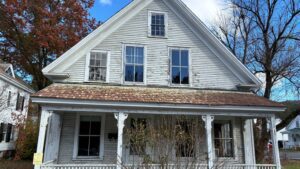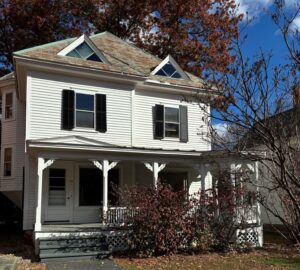By Emma Stanton, Vermont Standard Staff Writer
and Mike Donoghue, Vermont Standard Senior Correspondent
Several Woodstock historians and preservationists attended the Village Development Review Board on Monday evening to voice opposition to the proposed demolition of two historic village homes.
Nonetheless, at the conclusion of the meeting, the board voted 3-2 to approve the demolition of the two historic houses near the Woodstock Inn.
The vote came after the board went behind closed doors to consider the application on the two South Street homes.
Voting in favor of demolition were board members Wendy Spector, MaryAnne Flynn, and Keri Cole, according to village zoning administrator Emily Collins.
Board chair Jane Soule and vice chair Randy Mayhew were opposed to the demolition, Collins said.

During a meeting on Monday evening, the Village Development Review Board agreed to approve the application by The Woodstock Inn to have this property at 16 South Street demolished. The vote was 3-2 in favor.
The Historic Village properties, 14 South Street and 16 South Street, which have been owned by the Woodstock Inn & Resort for the past twenty years, were petitioned to be demolished. Woodstock Inn spokesperson Benjamin Pauly said they were deemed “No longer economically viable for commercial use.”
Pauly said at Monday’s meeting that the Woodstock Inn has no immediate plans to rebuild these homes.
The Inn petitioned to be granted the ability to demolish the homes and convert the area into green space with a plan to plant a few trees.
“We are under no obligation to provide future plans for the land,” Pauly added at the meeting.
Pauly said in the meeting that the Inn considered moving or renovating the historic homes, but decided against it.
“After exploring every option required of us by the Zoning Administration, the Inn has come to the resounding conclusion that demolition is the only responsible path forward,” he said. “We have made headway at the state level through Act 250, and now we ask this board to grant our application [for demolition].”
The demolition request was met with resistance by various local residents in attendance, with Wendy Wright Marrinan of the Village Historic Preservation Commission helping spearhead the conversation.
“I feel let down by The Inn,” Marrinan told the Village DRB on Monday night. “As I went through the history of these properties, I found that no adequate work has been done to maintain the integrity of these homes — which is a requirement in order for their application to be approved by this board,” she said.
Marrinan noted that, in addition to aesthetic neglect, the homes have obvious infrastructural issues, including missing slates on the roof, disrepair to the boiler and furnace in each respective property, and cracks to walls and floorboards. “I am seeing a disconcerting lack of interest on the part of the Woodstock Inn & Resort to protect what we value as a Historic Village. The more we take away, the less we have that belongs to the history of this town,” she said.
Marrinan added, “The Inn has fallen short in meeting the standards necessary to grant demolition.” She said, “The Village Historic Preservation Commission’s conclusion is that all the conditions have not been met by this application.”
Marrinan said the demolition request was troubling. “The language of the application is very concerning. We are talking about reuse of the buildings,” she said. She continued, “While the Woodstock Inn may have no use for these two homes, does that mean they should be torn down? Is there no way for these homes to be recycled by the community — sold to a family and preserved for future generations?”
While Pauly did not respond to this specific point, he maintained that the cost of renovating these homes to a habitable condition would be too great a financial undertaking for the Inn.
He also said the time required to find a potential buyer to either relocate or renovate these properties would be too great of a financial loss.
Several other residents spoke out against the demolition, including Woodstock residents Zach Benz, Isabelle Bradley, and Robert Pear.
The meeting this week was the second time the Village DRB had considered the request. Concerns were also raised when it first came to the board in September.
A second meeting was planned for last week, but the Vermont Standard alerted the village the day before that the session had not been properly warned to the public as required by the Vermont Open Meeting Law.
Municipal manager Eric Duffy later took exception to the headline in the Vermont Standard that said “Village Violates Open Meeting Law” with a subheadline that said the meeting had to be canceled.
In emails to the Standard this week, Duffy said the meeting was called off, so he contends there was no violation of the Vermont Open Meeting Law. He said it was just a “technical issue” that the required public notice did not appear on the municipal website as required by law. He also wrote that “the Town would have violated open meeting law if the meeting happened, but since it did not, no violation occurred.”

14 South Street, which has been approved by the Village Development Review Board to be demolished. This property is also owned by the Woodstock Inn.
After the Woodstock Corporation’s application request was heard in full, board Spector made a motion to deliberate in a closed session on the application — and two other cases heard that night.
In the end, all three were approved, including applications for Bonin Architect’s property at 19 Central Street and Freddie Bisceglia’s property at 2 High Street — the latter two by unanimous votes.
Under the governing structures within the Town of Woodstock, the Village Development Review Board is tasked with enforcing the zoning bylaws of the village and has the ability to decide on various zoning permits and preservation issues.
“Once a decision has been made internally amongst the board members, the village zoning administrator, Emily Collins, will write and post the decision with guidance from the Woodstock zoning bylaws,” Duffy had said before the meeting in an interview with the Vermont Standard.
Within the hour of the Village Development Review Board’s closed-door deliberation, Collins informed the Standard that “all three applications heard this evening were approved as presented.”
After the decision was released, Collins told the Standard, “The board found that the proposed demolition met the criteria set forth in the zoning regulations. We have 45 days from the close of hearing to issue a written decision, which is then mailed to the applicant and any interested parties.”
“There is a 15-day appeal period from the date the decision is issued. Interested persons as defined by 24 V.S.A. § 4465 can appeal, and they’re filed with the Environmental Division of the Vermont Superior Court. If an appeal is filed, the permit is stayed until the court resolves the matter. If no appeal is filed, the VDRB’s decision is final and binding, and the Zoning Administrator can issue the zoning permit,” Collins concluded.